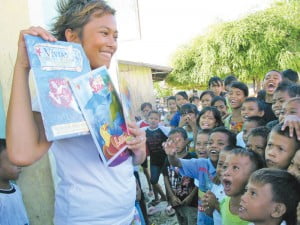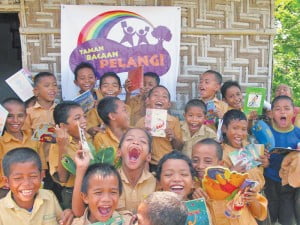Eastern Indonesia is a realm of a million wonders. A region rich in panoramic landscapes, biodiversity, and ancestral traditions, much of Eastern Indonesia remains relatively unadulterated by modern forces. Yet simultaneously, this poses the other side of the reality: infrastructure, education, and literacy remain great challenges there.
These challenges tugged the heart of 37-year-old Nila Tanzil. She fell in love with the beauty of Eastern Indonesia during her post as a communication consultant for a joint venture company responsible for protecting Komodo National Park. Back then Nila often travelled to villages around Flores and spent time with local children, whose afterschool activities were mainly playing at the beach or collecting firewood.
Today, Nila has opened 26 libraries all over Eastern Indonesia. Some of these libraries outlook gorgeous natural waterfronts, and are housed in historical colonial buildings, local ritual houses, and village art workshops. These libraries, called Taman Bacaan Pelangi (“Rainbow Reading Gardens”) have become a sanctuary of literacy for children ages 6-12, who come to read enthusiastically.
But it wasn’t always like this. In 2009, when Nila first came to Flores, she learned that literacy among schoolchildren was surprisingly low. Nusatenggara Timur happens to be the province with the highest illiteracy rates, lowest scores on national exams, and tremendous challenges in both infrastructure and the education system.
“Children learn to spell since they were in first grade, but many remain illiterate well into third grade,” said Nila. “A middle school teacher once told me about an illiterate student. I thought, how could a middle school student even pass the primary school exam without being literate? It turned out that the student had been assisted by a teacher throughout the exam, who would whisper the answers to him.”
Nila knew she had to do something for the children of Eastern Indonesia. Figuring that education was the key to this change, Nila decided to go for a need that has long remained unmet: literacy. “Books are the windows to the world,” said Nila. “I want them to love literacy and fall in love with books. But how are they to fall in love with books if the books aren’t even there? Many Eastern Indonesians struggle to put food on the table, more so to make books available.”
After initiating the idea in November 2009, the first Taman Bacaan Pelangi opened in Rowe, Manggarai Barat. In addition to Flores and other islands on Komodo National Park, the libraries are now found in remote villages in Lombok, Sumbawa, Timor, Bandanaira, and South Sulawesi. These libraries are run by volunteers made up of mostly local schoolteachers.
“It’s called Pelangi because this project involves many ethnicities, races and colours, just like a rainbow. Put them together and you end up with something beautiful, uniting in one mission to nurture literacy in Eastern Indonesian children and enlighten them,” Nila continued.
Nila said that the first step to get children to read is to bring the books close to them. With schools often being far away from the villages, it is thus important to make it fun for them. To make the children not feel like they’re doing any more homework for school, Taman Bacaan Pelangi is stocked up with fun illustrated books.
“I fell in love with books from reading Donald Duck and Bobo magazine,” said Nila. “At least even if the children can’t read yet, they would pick up a brightcoloured book like Tintin or Asterix & Obelix. They’d flip the pages, curious with the story behind the pictures, and it would motivate them to read.”
“If the children already love reading, they’d read anything,” added Nila. One day a father came to Nila, telling her that his son scored 90% on his science exam. The son did not learn the answers from class, but from an illustrated encyclopaedia in Taman Bacaan Pelangi.
On another day, teachers told Nila that the children’s compositions in the Bahasa Indonesia exam are improving because now their plots are clearer and vocabulary is increasing. Nila calls such news “little victories”, remembering that most of these children’s mother tongues are not Indonesian, and that their cultures are mostly based on oral tradition.
When Nila first met the children and asked them what they aspire to be when they grow up, their answers were invariably “teaching” or “pastoring”. The only other professions these children knew were farming and fishery. But now literacy has stimulated the children’s imagination, helped them identify other professional needs in their community, and inspire them to dream of professions that are different from that of their parents. Other aspirations now heard among these children include becoming engineers, architects, business owners, and writers.
Nila also remembers a time when children in Komodo National Park could only dream of travelling to Labuan Bajo in the west of Flores. “Not even Bali,” said Nila, who often shares to the children her photos of travelling abroad. “But now they dream of visiting faraway places like Thailand, Cambodia, Japan and the UK.”
Nila believes that nurturing literacy in children is a project of influencing them for a lifetime. “I hope one day these children will get scholarships, leave the village to attend university, become successful professionals out there, do their community proud, then come back to develop their hometowns.”
While Taman Bacaan Pelangi is meant to be an agent of change and progress in Eastern Indonesia, Nila also aims to make it a place where local traditions continue to flourish. Taman Bacaan Pelangi holds storytelling programs where volunteers would read illustrated versions of local ancestral folklores or demonstrate them with origami. Some libraries also provide traditional dance and music lessons.
In order to move more than 20,000 books between 11 islands, Taman Bacaan Pelangi collaborates with airlines and ship owners to rotate the collection between libraries every six months. Some locals even help transport the books inland with their trucks, private cars, and motorcycles.
“I’m thankful for all the volunteers in Eastern Indonesia and Jakarta, as well as those who have donated books. They are the real people in service, fighting on the forefront of Taman Bacaan Pelangi,” said Nila.
Having initiated the libraries as a personal project in her free time, Nila has recently decided to commit full-time to Taman Bacaan Pelangi. Additionally, Nila is writing a book about her travels in Eastern Indonesia and her journey of painting the colours of literacy among the nation’s children.
To learn more about Taman Bacaan Pelangi, literacy in Eastern Indonesia, volunteer, or donate, visit www.tamanbacaanpelangi.com.





